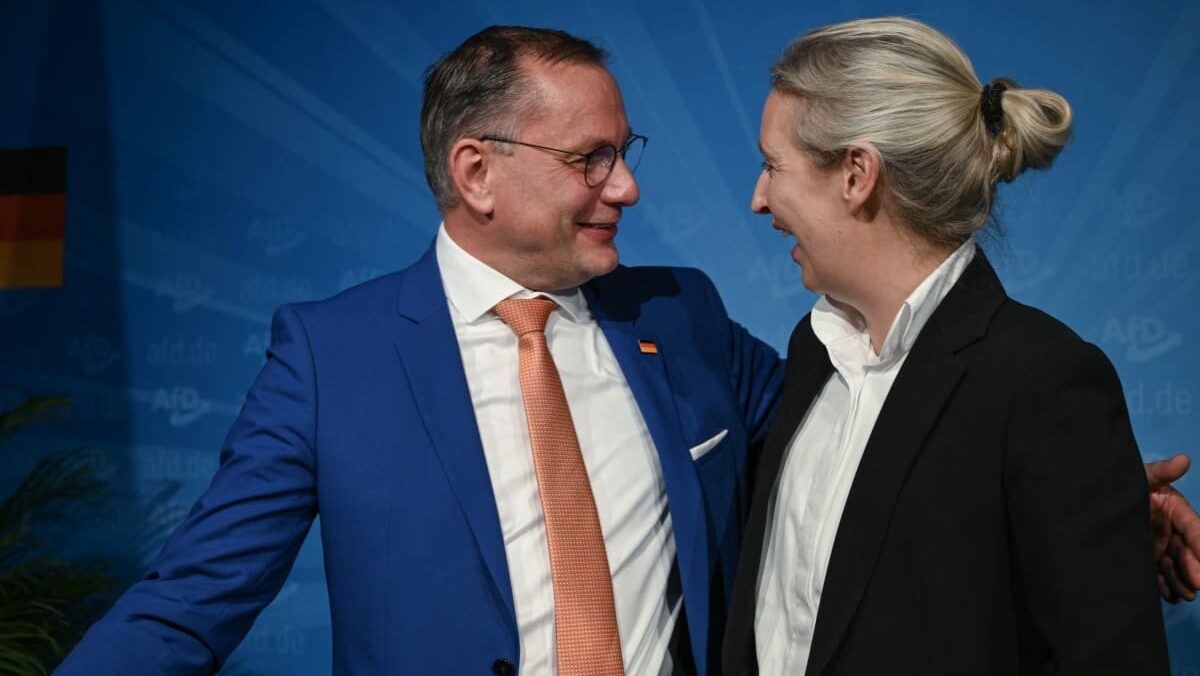
Co-leaders of Alternative for Germany (AfD) party Alice Weidel (L) Tino Chrupalla (R) cheer on stage after first exit polls during the Electoral evening after the European Parliament elections in Berlin, on June 9, 2024.
Photo: RALF HIRSCHBERGER / AFP
Voters have sent a clear message to the German coalition to “drastically change [its] politics on migration, on the economy and on climate protection,” wrote Germany’s daily Bild after the European elections held on Sunday.
The three parties of the left-liberal government suffered a humiliating defeat, with the Social Democrats suffering their worst result ever. The party of Chancellor Olaf Scholz came third with 13.9%, which translates to 14 seats in the European Parliament (out of the 96 allocated to Germany).
Germany (European Parliament election):
— Europe Elects (@EuropeElects) June 10, 2024
Preliminary final results (seats)
CDU-EPP: 23
AfD-NI: 15
SPD-S&D: 14
GRÜNE-G/EFA: 12
CSU-EPP: 6
BSW→NI: 6
FDP-RE: 5
LINKE-LEFT: 3
FW-RE: 3
Volt-G/EFA: 3
…
Special election page: https://t.co/1An2baUJmP#Europawahl2024 #EP2024 pic.twitter.com/XYWJKG0Esc
The Greens endured even worse losses, dipping to 11.9% (12 seats) from 20.5% (21 seats) five years ago—a sign that voters are fed up with the climate and energy policies—like the closing down of all Germany’s nuclear reactors—that have burdened citizens, the war against farmers, and plans to ban new combustion engine cars. As the conservative publication Junge Freiheit jokingly put it:
The voters, who thanks to “promises of progress” are now allowed to choose their gender every year, but in a few years will no longer be able to choose which car they can drive, send their regards.
The third coalition partner, the liberal FDP, which has been overshadowed by its partners in the government and has not been able to pursue its own policies of sensible energy, stricter fiscal and immigration policies, remains in a depleted state with 5.2% and 5 seats—the same as in 2019.
Voter turnout in Germany was the highest since European elections were first held in 1979 at 64.8%, which further undermines the legitimacy of the government.
Opposition centre-right CDU’s General Secretary Carsten Linnemann said Olaf Scholz should call for a “vote of confidence” following the dismal result. The coalition must either change course “or clear the path for new elections,” he added. The CDU/CSU alliance won the elections on Sunday, receiving 30% of the votes (29 seats) although their result wasn’t much better than the 28.9% they got in 2019, when they also won 29 seats in the European Parliament.
The big winners of election day were two anti-establishment, anti-globalist parties, the right-wing AfD and the left-wing Bündnis Sahra Wagenknecht (BSW). AfD finished in second place, and increased its share of the votes from 11% to 15.9%—from 11 to 15 seats—despite numerous setbacks and scandals in recent months.
The party is being hounded by the political elite and mainstream media for its anti-immigration stance: there have been calls for the AfD to be banned for allegedly endangering the democratic order, and it is legally being spied upon by the intelligence services. A hit piece on AfD by the left-wing, government-funded media outlet Correctiv, which falsely accused the party of being involved in a plot to deport millions of migrants, was also intended to put a dent in the party’s popularity. The latest setback came from very poorly chosen words by the party’s lead candidate at the EP elections, Maximilian Krah who relativised the crimes of SS soldiers. His comments led to the expulsion of the AfD from the right-wing Identity and Democracy group in the European Parliament.
Nevertheless, the party made big gains, and jointly with the CDU/CSU alliance, is the most popular party among young voters aged 16-24. It increased its share among young people by 12 percentage points to 17%. Among blue-collar workers, the AfD was by far the largest party.
Germany (European Parliament election): according to exit poll data by Infratest dimap, far-right AfD (NI) has become the largest party among blue-collar workers. #EP2024 #Europawahl2024
— Europe Elects (@EuropeElects) June 9, 2024
Special election page: https://t.co/1An2baUbxh pic.twitter.com/1SjwwmqAIS
AfD co-chairman Alice Weidel assessed her party’s showing by saying:
We’ve done well because people have become more anti-European. People are annoyed by so much bureaucracy from Brussels.
She, too, urged Olaf Scholz to call early elections.
Die gestrige #Europawahl war mehr als das: Deutschland hat gleichzeitig Kanzler & #Ampel abgewählt. Für #Scholz gibt es jetzt nur noch eine Aufgabe: Den Weg freizumachen für #Neuwahlen – statt ein weiteres Jahr gegen eine große Mehrheit der Bevölkerung zu regieren! #AfD pic.twitter.com/Ft2iSuXn8n
— Alice Weidel (@Alice_Weidel) June 10, 2024
The AfD has tapped into frustrations with Scholz’s coalition, as voter discontent remains high over issues ranging from climate laws to spending cuts, as well as crime and immigration. The recent murder of a policeman by an Afghan failed asylum seeker highlighted the problems Germany is facing.
“Despite self-inflicted wounds and the strong, newly founded BSW, the AfD was able to continue its improvement. The CDU/CSU has not profited from the disastrous state of the government. The Brandmauer (firewall) to exclude the AfD has fallen,” Hermann Binkert, the head of the INSA polling institute, told Bild.
Frustrations with the ongoing war in Ukraine and Germany’s unwavering military support may also have played a role in AfD’s and BSW’s rise in popularity. The latter, a party established only this year by Sahra Wagenknecht (by splitting from Die Linke), got 6.2% of the votes (6 seats) on Sunday. The party campaigned on an anti-immigration and anti-war platform, urging the government to halt weapons deliveries to Ukraine and focus on peace talks instead.
